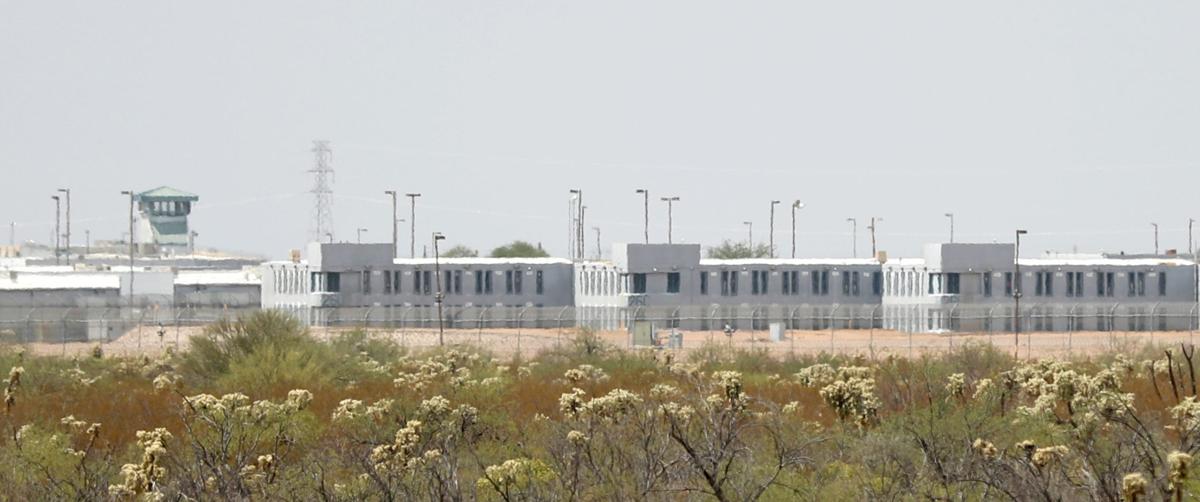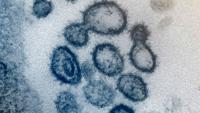Ruben Silva, an inmate at the state prison in УлшжжБВЅ, asked for medical attention days before his COVID-19 test came back positive, he told his sister.
His temperature was not high, so nurses told him he did not have coronavirus symptoms and dismissed his concerns, he told his sister, Nanette Scolli, in emails.
On July 30, his COVID-19 test came back positive, and he was taken to a pod where all COVID-positive inmates were being housed.
Silva is one of 517 inmates in the Whetstone unit in the prison complex who tested positive for the virus after the УлшжжБВЅ Department of Corrections, Rehabilitation and Reentry started testing all prison inmates. The department reported the outbreak Aug. 4 and said the test results came in over several days.
A late-July spike in Pima County COVID-19 cases shown on the УлшжжБВЅ Department of Health COVID-19 webpage reflects most of those cases. July 30 shows 642 cases, the highest number of cases by far that month.
People are also reading…
Silva told his sister that he and other inmates spent more than five days showing symptoms and waiting for test results while living in close quarters with inmates who tested negative. Some of the inmates who tested negative have since started to have symptoms, another prisoner said.
With testing expected to be completed in September, the УлшжжБВЅ Department of Corrections has not said whether it plans to retest any inmates unless theyтre showing symptoms.
тThe testing allows us to identify asymptomatic spread and isolate and cohort inmates as needed in order to mitigate COVID-19 spread within our congregate setting,т Bill Lamoreaux, a spokesman for the УлшжжБВЅ Department of Corrections, said in an email.
There have been 883 COVID-19 cases in the УлшжжБВЅ prison and five coronavirus deaths, the highest in any prison in the state.
The prison complex in УлшжжБВЅ houses more than 4,700 inmates, including 1,032 in the Whetstone unit. In the УлшжжБВЅ prison, 4,372 inmates have been tested, with 3,292 testing negative for the virus. The department is waiting on results for 197 tests, and 63 inmates have recovered.
After the УлшжжБВЅ reported that the Whetstone Unit in УлшжжБВЅ had more than 500 positive coronavirus cases earlier this month, several family members and friends of prisoners shared copies of emails from inmates concerned about further spread of the virus.
тSince the beginning of the COVID-19 pandemic, the Department has taken significant actions to mitigate the risk and impacts of COVID-19 in its facilities,т Lamoreaux said. тKeeping our staff, inmates and communities safe continues to be our top priority.т
тThey canтt handle this outbreakт
In emails shared with the Star, УлшжжБВЅ inmates told their family their health needs are being ignored until they become gravely ill. They said they are going days without a shower or clean clothes.
In one email, an inmate said he had just returned from his job in the prison when he got his test results. He was told he tested negative, then positive, then negative again and was moved back and forth between housing with sick inmates and housing with COVID-negative inmates.
тI donтt even know what to do or say at this point anymore, but I told them Iтm not moving,т wrote the inmate, whose friend asked not to be named for fear of retaliation. тI mentally canтt deal with yet settling into another house and know Iтm spreading COVID.т
He says staff threatened to take him to тthe hole,т or isolation, if he didnтt comply. The inmate eventually complied but said he was moved back to the pod with sick inmates after they determined his results were ultimately positive.
On July 30, Silva told his sister he had been sick for a while. He said inmates live between 1 and 3 feet apart, and several share a small room.
тThey canтt handle this outbreak by moving people around with week-old information as to whoтs sick and whoтs not,т he told Scolli.
Lamoreaux said movements happen on a case-by-case basis. New inmates are tested at the state prison in Phoenix where the department receives transfers from county jails. The inmates are monitored for 14 days before being moved to a prison within the system, Lamoreaux said.
тSo scared,т тCanтt breatheт
On July 2, Barbara Hudson died in the San Carlos Unit in Perryville Womenтs Prison in Goodyear. Before her death, she sought medical care for shortness of breath and chest pain, said Kim Crecca, convenor of the Diocesan Prison Ministry, who has volunteered at Perryville and communicates often with prisoners.
тMedical dismissed her concerns without testing her for COVID,т Crecca said. тI have several eyewitness reports that were with her when she passed away, stating that her last words were, тSo scared,т and тCanтt breathe.т"
The Department of Correctionsт COVID-19 data dashboard shows zero deaths due to COVID-19 in the Perryville Prison.
Crecca said she is skeptical of the number of inmate deaths due to COVID-19 as the Department of Corrections has been reluctant to share information about how they determine whether to investigate a death as COVID-19 related.
Crecca is part of the , a group of faith-based leaders across the state that organizes people for social and economic improvement.
тWe feel that her death is a rallying cry, not only to help with the release of inmates as possible but also about the underlying conditions there that make them really vulnerable to the virus,т Crecca said.
Ignoring early signs of virus
After being moved to a housing area for coronavirus-positive inmates, Silvaтs symptoms got worse, and he was taken to isolation. He had fluid in his lungs, was on an oxygen machine on and off for at least three days and suffered from body aches, he told his sister. He said he went days without a shower or clean clothes.
тIтm not anybody special here, but Iтm not a nobody either,т he told his sister.
While in isolation, Silva said he had to pull strings to be able to send an email, and that he didnтt have soap, a toothbrush or toothpaste.
тI did nothing to deserve this punishment,т he said.
Scolli recently went almost three days without hearing from her brother. When she reached a corrections officer, she was told her her brother had been taken to a hospital because he had a stroke.
He was back in prison and feeling better a few days later, she said on Aug. 19.
Silva said another inmate was feeling sick but got no medical attention until he had a fever of 104 degrees and was taken to the hospital.
A longtime friend of Scolliтs who is also at Whetstone, Grady Ingram, told her inmates were threatened with disciplinary action earlier during the pandemic if they were caught wearing masks because it was a security risk.
тIt was alarming very early on in our conversations with the state about how they were not addressing the asymptomatic nature of the virus,т said Joe Rubio, lead organizer of the УлшжжБВЅ Interfaith Network.
Prison staff has been required to wear cloth face coverings since June 15 and inmates were provided with face masks on July 2, Lamoreaux said.
тIтm grateful to them for changing that policy and that practice, but I think the implementation of it still leaves a lot to be desired in terms of actually keeping people safe,т said Rev. Jennifer A. Reddall, bishop of the Episcopal diocese.
тI can choose to keep away from people, I can choose to wear a mask, I can choose to stay home, I can choose to keep myself and my family safe,т Reddall said. тInmates do not have that ability. They do not get to choose to keep themselves safe, and so itтs up to all of us to make sure that policies keep them safe and make sure that those policies are enforced.т
Pushing the state to protect inmates
Ingram said inmates were told they had to submit a health needs request in order to get medical help.
Submitting a health needs request cost inmates $4 unless they were experiencing symptoms related to COVID-19, but only fever was considered a COVID-19 symptom, prison volunteer Crecca said.
After providing several examples of inmates being turned away despite having possible COVID-19 symptoms, the department eventually agreed to suspend medical copays at the end of July, Crecca said.
тI see this as a positive action on their part as it encourages rather than discourages reporting of possible symptoms,т she said.
The faith groups started meeting with Department of Corrections Director David Shinn in April and less often with Dr. Cara Christ, УлшжжБВЅ Department of Health Services director, to discuss what the state could do to better protect inmates from the virus.
Those discussions led to the department implementing the testing blitz, and allowing inmates to wear masks.
Father Hunter Ruffin, the pastor at Church of the Epiphany in Tempe, said that with the department nearing the end of testing all inmates, the group is waiting to hear how the state will monitor further exposure.
They are also asking Schinn to release people 90 days before their release date.
УлшжжБВЅ law does not allow people to be released to house arrest if theyтre high risk for contracting COVID-19 because of their age. But that could be changed through legislative action.
The group will also continue to ask the state to provide a high level of health care for inmates, Ruffin said.
тWe find it deplorable that somebody would die in prison because they were not able to get access to appropriate medical care,т he said.
Testing is not mandatory for anyone, and officers get tested outside the prison and self-report their results.
Bishop Reddall said the group has suggested the state do pool testing moving forward, where they test a sample from a large group of people together and only test those samples individually if at least one test result is positive.
тNo one who is incarcerated should have a death sentence by virus, but particularly those who are incarcerated for low-level offenses,т Reddall said. тThey should not be put in a place where theyтre going to die because of some infraction.т
Photos for May 29: УлшжжБВЅ gets by during Coronavirus Pandemic
УлшжжБВЅ gets by during coronavirus pandemic

The iconic Casa Molina bull and matador statue both sport masks on the first full week of the loosening of COVID19 restrictions, May 23, 2020, УлшжжБВЅ, Ariz. The bull previously had a mask on the testicles.
УлшжжБВЅ gets by during coronavirus pandemic

Michelle Leon Cordova, right, mother, and her son Sahuarita High School senior Lino Cordova, whom is fighting cancer, wave at staff members from Diamonds Children Center, friends and the Marana Police Department during a car parade, celebrating Lino's graduation, outside of his home on May 13, 2020 in Sahuarita, Ariz. Cordova stood on the sidewalk while the team from Diamond Children Center, friends and the Marana police department gave Cordova a graduation gar parade. Cordova was given a gift basket with his favorite snacks, gift cards as well as other items he enjoys. The car parade, also, celebrated another graduating senior fighting cancer from Empire High School, Noah Nieto. Nieto, also, received a gift basket with snacks, gift cards and other items Lino enjoys.
УлшжжБВЅ gets by during coronavirus pandemic
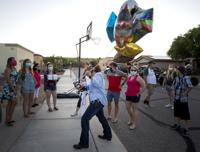
Michelle Leon Cordova, right, mother, brings celebration balloons to a car after staff members from Diamonds Children Center, friends and the Marana Police Department celebrate Sahuarita High School senior Lino Cordova, whom is fighting cancer, graduation with a car parade outside of his home on May 13, 2020 in Sahuarita, Ariz. Cordova stood on the sidewalk while the team from Diamond Children Center, friends and the Marana police department gave Cordova a graduation gar parade. Cordova was given a gift basket with his favorite snacks, gift cards as well as other items he enjoys. The car parade, also, celebrated another graduating senior fighting cancer from Empire High School, Noah Nieto. Nieto, also, received a gift basket with snacks, gift cards and other items Lino enjoys.
УлшжжБВЅ gets by during coronavirus pandemic

Personnel from УлшжжБВЅ Medical Center line the heliport to watch A-10's from Davis-Monthan Air Force Base's 355th Wing and F-16's from the УлшжжБВЅ Air National Guard's 162nd Wing make a pass over the facility, one leg of an area wide community flyover, May 14, 2020, УлшжжБВЅ, Ariz.
УлшжжБВЅ gets by during coronavirus pandemic

Nancy Celix-Campos, right, a respitory therapist at УлшжжБВЅ Medical Center, watches the military flyover with her daughters, Giana, 12, and Jazmyn, 8, from Sentinel Peak on May 14, 2020. Two F-16 Fighting Falcons from УлшжжБВЅ Air National GuardУs 162nd Wing and two A-10 Thunderbolt II's from the 355th Wing, assigned to Davis-Monthan Air Force Base, fly over УлшжжБВЅ area hospitals to honor healthcare personnel and first responders as they are some of the frontline workers dealing with the coronavirus disease (COVID-19) head on. "It's been an exhausting two to three months," says Campos, "it's pretty cool, I like how they're going by each hospital."
УлшжжБВЅ gets by during coronavirus pandemic

Two F-16 Fighting Falcons from УлшжжБВЅ Air National Guardтs 162nd Wing and two A-10 Thunderbolt II's from the 355th Wing, assigned to Davis-Monthan Air Force Base, fly over Northwest Medical Center north of УлшжжБВЅ on May 14, 2020.
УлшжжБВЅ gets by during coronavirus pandemic
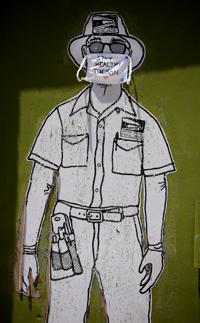
A letter carrier portrait on the Ok Market building, located in the Armory Park neighborhood, is adorned with a face mask on May 18, 2020.
УлшжжБВЅ gets by during coronavirus pandemic
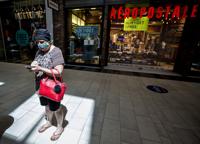
Rosemary Garcia waits for a family member outside of a store at Park Place Mall, 5870 E. Broadway Blvd., in УлшжжБВЅ, Ariz. on May 19, 2020. Malls reopened today under CDC guidelines and Gov. Ducey's new rules for businesses due to the Coronavirus pandemic. Park Place Mall has signs throughout the mall reminding customers to keep a six feet distance as well as hand sanitizer stations near each entrance. About half of the tables in the food court have been removed to allow for social distances as well as less than half of the stores have opened with new guidelines. Of the stores open, only 10 customers are allowed to shop in each store at a time.
УлшжжБВЅ gets by during coronavirus pandemic
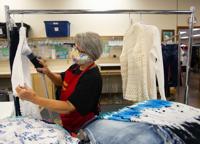
Pat Schlote steams clothing before it is put on the sales floor at the Golden Goose Thrift Shop in Catalina, Ariz., on May 21, 2020.
УлшжжБВЅ gets by during coronavirus pandemic
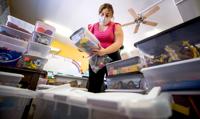
Ada Contreras, teaching assistant, looks through containers while reorganizing toys at Herencia Guadalupana Lab School, 6740 S. in УлшжжБВЅ, Ariz. on May 21, 2020. As Child care centers begin to re-open when they are ready, Herencia Guadalupana Lab School is reorganizing and cleaning everything in the facility before re-opening on June 2. To allow for social distancing and decrease the amount of items children touch, Herencia Guadalupana Lab School has sheds where items will go as well as placing items in containers organized by category.
УлшжжБВЅ gets by during coronavirus pandemic
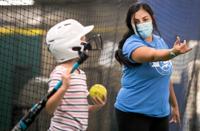
Jen Martinez, right, softball coach, teaches Skylar Reilly about hitting during a session at Centerfield Baseball Academy, 5120 S. Julian Dr., in УлшжжБВЅ, Ariz. on May 21, 2020. After re-opening on Monday, Centerfield Baseball Academy has implemented new policies in response to the Coronavirus Pandemic such as wearing masks, cleaning, signage, hand sanitizer and limiting the amount of people inside the facility.
УлшжжБВЅ gets by during coronavirus pandemic

Karl Bosma, left, and George Cantua, with facilities and maintenance, lay down stickers to mark six-foot separation distance around one of the baggage carousels, part of the efforts at УлшжжБВЅ International Airport to work within the restrictions of COVID19, May 22, 2020, УлшжжБВЅ, Ariz.
УлшжжБВЅ gets by during coronavirus pandemic

A lone passenger waits for a flight near one of the shuttered restaurants in the B Gates before Memorial Day at УлшжжБВЅ International Airport on May 22, 2020.
УлшжжБВЅ gets by during coronavirus pandemic

Drew Cooper on the stage in the St. Philip's Plaza courtyard, May 22, 2020, УлшжжБВЅ, Ariz., where live music is back on the schedule.
УлшжжБВЅ gets by during coronavirus pandemic

Many people visit Tumamoc Hill during the first day of Tumamoc's re-opening in УлшжжБВЅ, Ariz. on May 25, 2020. After being closed due to the Coronavirus pandemic, Tumamoc Hill re-opened with some modifications. There are hand sanitizer stations throughout the hike to the top as well as arrows, spaced 10-ft apart, lined up and down the hill. Some runners, hikers and walkers are also wearing masks during their hike. "The steps we are taking aim to provide our community with needed exercise, connection to our beautiful desert and a sense of comfort in such a trying time, while balancing the fact that gathering as a community endangers each of us and our loved ones. This is an unprecedented challenge that we are taking extremely seriously," said Benjamin T. Wilder, director of Tumamoc Hill. Visitors are also asked to limit their group to three people and to not touch the gate at the top of the hill- a tradition for some who make it to the top. "This is a time when we need to establish new traditions and adapt in a creative manner that embraces empathy, unity, care and patience," Wilder said.
УлшжжБВЅ gets by during coronavirus pandemic
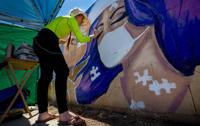
Pen Macias, artist, works on part 2 of a mural for a client on E. Broadway Rd., between S. Columbus Blvd. and S. Alvernon Way, in УлшжжБВЅ, Ariz. on May 25, 2020. Macias, known as The Desert Pen, has been working on her clients mural for the past three months. "It's the one thing I love, I have a passion for and the only thing I could be happy doing," said Macias. The mural represents her client, a single mother of four who works in the health care field. One half of the mural is dedicated to the connection between mothers and their children. The other half is dedicated to the connection between nurses and patients. The client wanted some positivity in the mural to show how nurses give a piece of themselves to their patients hence the puzzle pieces in the nurse and the patients, said Macias.
УлшжжБВЅ gets by during coronavirus pandemic
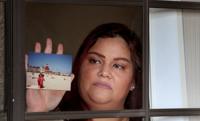
Christina Cortinas, posing at her home, May 28, 2020, УлшжжБВЅ, Ariz., with a photo of her and her mother, Catherine Rodriguez, in San Diego, 1991. Rodriguez is currently in assisted living and fighting COVID19. Cortinas hasn't seen her mother in months, the longest such span in her life.
УлшжжБВЅ gets by during coronavirus pandemic

Ruben Lopez looks through handouts while attending a Eviction Resource Fair with his family outside the Pima County Justice Court.


